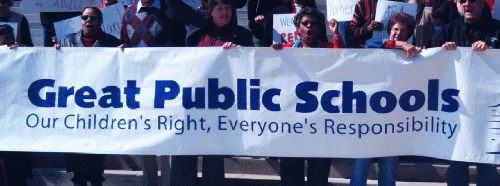I bring this incident up because I grew up in a town not far from Chappaqua -- a decidedly less affluent northern Westchester County suburb. I have been hearing about this story from my mother, who often relays the local news. From what I can gather, there is a feeling of "this doesn't happen here" and "this is not the kind of school where these things occur." It's not surprising. You hear this all the time from residents who are interviewed by the news media after an otherwise "unheard of" crime occurs in their wealthy enclave. And at Horace Greeley, things are different. This school is known as a sort of private-public school, always ranked as one of the best public high schools in the nation. It sends its students to all of the top-tier universities, and its students go on to successful careers. It is not at all coincidental that Chappaqua households are listed among the highest-income in the country as well.
A school's success is inextricably tied to wealth for a number of reasons. In public schools, the major source of revenue is derived from property taxes. Obviously, an abundance of multi-million dollar properties will generate higher returns for a school district than the cheap real estate of the poor and middle-class. But above that, whether students in rich neighborhoods attend public or private schools, whatever their schools may lack, their parents can make up for in donations. We can all help fund our children's schools, but while poor households may not even be able to spare pennies, and middle-class households might be able to spare $10 or perhaps as much as $100 dollars, rich households could "sacrifice" $10K, $100K, or for some, even millions of dollars without blinking an eye. That is how much wealth disparity exists; it is truly incomprehensible.
Unequal funding in schools results in inequitable educational opportunities. Schools with more money have greater resources. And greater resources does not mean technology, because there is no evidence that technology enhances education (it merely benefits the tech industry). It means smaller class sizes, ample books and supplies, access to music, art, and physical education, availability of field trips, clean classrooms, and well-paid teachers who are not overburdened with untenable conditions and who are not struggling themselves to make ends meet. There is a reason that the students in Beverly Hills were performing better, on average, than the students I once taught in East Los Angeles -- and it had nothing to do with the students' abilities. Instead, it had everything to do with the superior resources available to both students and teachers in richer school districts (along with the horrendous hunger, poverty, and homelessness rampant in schools in lower socio-economic neighborhoods).
A recent episode of "This American Life" explained how school integration was a monumental success in increasing student performance and narrowing the achievement gap for people of color, not because of racial intermingling, but because black students were able to access the same education opportunities as white students. It follows that desegregation of schools should be implemented not just on the level of race but on the level of economic status. If we really want to fix our public school system, students of all races and all socio-economic strata need to co-exist at all public schools, and there needs to be an end to all private and charter schools.
Charter schools have done little to aid in providing a better quality education to all -- mainly because that is not what they were established for. Charters do not have the same mandates as public schools, so they do not have to follow all of the same onerous, bureaucratic regulations. These directives were put in place by the capitalist governing class who purposefully constructed them to undermine public education. With the failure of public education, the capitalist class could make way for a new open market in education. With charter schools, the taxpayers could pay for the market and all of the profits could be had by industry. That is not to say that all charter schools were created by corporate profiteers (though that is true in an alarming number of cases). Many charter schools were established by good educators with the best of intentions for students. I know of a number of them and worked at one over a decade ago. That is also not to say that some students do not benefit from a charter school education, whether socially or academically (though research shows that, overall, this is not the case). But these exceptions are akin to a handful of people sharing a winning lottery ticket while everyone else remains left behind. They amount to educational fortune, but not educational justice.
Imagine if all of the nation's rich folks were forced to send their children to plain-old public schools, along with students of middle-incomes and students of low- or no incomes. First, any crowded classrooms, unclean conditions, problems with teachers, or lack of resources would be nipped in the bud, because the rich parents would pour their money, their time, and their lawyers into improving the conditions for their children (and thus, all of the children). Second, the rich children would learn a great deal from their less wealthy peers about people who do not have access to the wealth and privileges that they do, hopefully, making they more sympathetic and empathetic to the conditions of others. Third, the wealthy parents might not feel comfortable having their children mingle with the non-wealthy hoi-polloi, so they may actually learn empathy as well. They may think more closely about socio-political issues and they might learn about the reality of other people's lives, about the plight of others from the actual struggles of their childrens' peers, rather than from the propaganda and hearsay they gather from their perch on high. They might, in turn, use their fortunes to help to improve the quality of life for their childrens' peers and maybe, for the rest of the 99% of the country.
While there is no doubt that the eradication of poverty, hunger, homelessness, and gross income inequality overall would drastically improve the educational success of all students, it also seems that the preservation of what could be and should be an exceptional public school system in America is imminently achievable. But, it cannot be done with the useless reforms and technological tools that are currently being pushed on the public. The solution to educational equality relies on the total integration of all American students into diverse yet equivalent, well-financed public schools.
Now, exactly what kids are being trained for in school -- to be corporate technocrats and to perpetuate society's plunge into planetary ecocide and species suicide " That's a whole other issue "
(Article changed on September 30, 2016 at 17:52)






